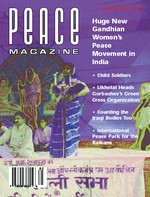
Peace Magazine Jan-Mar 2004, page 30. Some rights reserved.
Search for other articles by Karin Brothers here
Lloyd Axworthy, Toronto: Knopf, 2003. 450 pp; $37.95.
Lloyd Axworthy's Navigating a New World: Canada's Global Future is a call to reverse the path Canada is now following, a path that will lead to the loss of control over Canadian security, resources, and values.
Trade deals and joint security arrangements with the US are routes to economic and military integration. The predicament is made worse by the influence of US business and media on Canadian government and society.
While US leaders extol the wealth generated from NAFTA and other trade agreements, Axworthy sees them as increasing Canadian poverty and environmental degradation. He sees US-defined globalization as an affront to democracy and a disaster for developing countries. Axworthy's vision is of a global community based on rules rather than power; of alliances that would balance the overwhelming power of the US; of a new paradigm of individual human security (as defined by the 2002 report "The Responsibility to Protect") that would counter current concepts of absolute sovereignty and the interests of trade and power; and of a world of concerned, connected citizens working toward a truly democratic and open global citizenship.
Axworthy states that Canada must "marshall (its) resources to fight for (its) freedom to manoeuvre and use that freedom to advance international goals that serve (its) goals and reflect (its) interests; it must retain the freedom to make choices based on Canadian values." An experienced and resourceful public servant, Axworthy provides guidelines based on his experience as Minister of Foreign Affairs, including his successful effort on the banning of landmines. His primary strategies are to work toward global citizenship; to strengthen democratic international organizations; to form many kinds of tactical alliances; and to communicate Canadian positions more effectively internationally. Among his specific recommendations are:
Cynics may suggest that powerful interests will continue to block international human right legislation, or that a superpower will not easily give up the "rights" it has accorded to itself, or respect values that are not its own, or bow to a world community of smaller, weaker states.
But Canadians do not have a choice; they must act to preserve their rights and values. (A recent poll by the Centre for Research and Information in Canada found that a majority either did not want closer ties to the USor felt that current ties were already too close.)
Following Axworthy's advice may be the best course to ensure independence at home and fairer international relationships abroad. He has pointed us toward the routes we must take to maintain the well-being, not only of Canadian society, but of the world.

Peace Magazine Jan-Mar 2004, page 30. Some rights reserved.
Search for other articles by Karin Brothers here